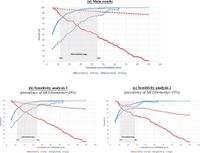A groundbreaking digital cognitive test, named PENSIEVE-AI, has been developed to enhance early detection of cognitive impairment (CI) in older adults, significantly aiding those with lower literacy levels.
The study, which gathered data from 1,758 community-dwelling individuals aged 65 and older in Singapore, emphasizes the critical need for effective early diagnosis amidst a global landscape where undiagnosed cognitive impairment remains pervasive. Traditional assessments often fail many, particularly in underserved communities where literacy is a barrier.
"PENSIEVE-AI was trained and validated using clinically-adjudicated diagnoses in a large, prospectively-recruited community sample," wrote the authors of the article. The digital test is designed to be self-administered within five minutes and relies solely on drawing tasks, which helps to diminish the impact of literacy constraints.
The innovative approach employed a deep-learning model that achieved an Area Under the Curve (AUC) of 93.2% for detecting mild cognitive impairment and dementia, a performance comparable to traditional neuropsychological assessments, which registered an AUC of 94%. Crucially, the test was consistently effective across different educational levels and ethnic demographics.
Participants reported a median completion time of just 3.7 minutes, reflecting the tool's accessibility. However, those diagnosed with MCI or dementia required slightly more time to navigate the test's digital interface.
The testing model, which utilized the VGG-16 framework enhanced by interactive drawing tasks, illustrated superior results when educational attainment was factored in. This advancement is especially important, as it was previously noted that many existing cognitive tests were developed on populations with high literacy rates, limiting their applicability in lower literacy contexts.
In evaluating PENSIEVE-AI against more established cognitive assessment tools like the Montreal Cognitive Assessment (MoCA) and the Neuropsychological Test Battery (NTB), it was notable that PENSIEVE-AI performed similarly well, achieving AUCs between 93.1% and 95.3% for MCI and dementia detection across varying educational backgrounds.
"Despite being brief, PENSIEVE-AI demonstrated excellent performance in detecting MCI/dementia, comparable to detailed neuropsychological testing," wrote the authors of the article. This finding reinforces a shift toward quick and efficient cognitive assessments that can reach a wider audience.
By employing a two-cutoff approach—using a lower cutoff probability of 13% to rule out CI and an upper cutoff of 45% to identify cases likely needing further assessment—PENSIEVE-AI facilitates an effective strategy for stratifying risk in community settings.
The implications of this tool extend far beyond Singapore, targeting similar populations across Asia and low- and middle-income countries struggling with high rates of undiagnosed cognitive impairment. The research team’s ambition is to deploy PENSIEVE-AI within various cultural and linguistic environments to maximize its utility.
Furthermore, this cognitive tool can potentially mitigate healthcare costs associated with late-stage dementia diagnoses, promote better health outcomes, and deliver necessary support to individuals in need.
Moving forward, the researchers aim to translate PENSIEVE-AI into local languages and test its effectiveness beyond Singapore. This scalability is crucial as the aging population grows globally.
In conclusion, PENSIEVE-AI is set to transform cognitive assessments, demonstrating that effective and inclusive tools for detecting cognitive impairment are both necessary and achievable. The validation of this digital tool could represent a significant advancement in public health, addressing cognitive health within diverse communities adeptly and efficiently.




